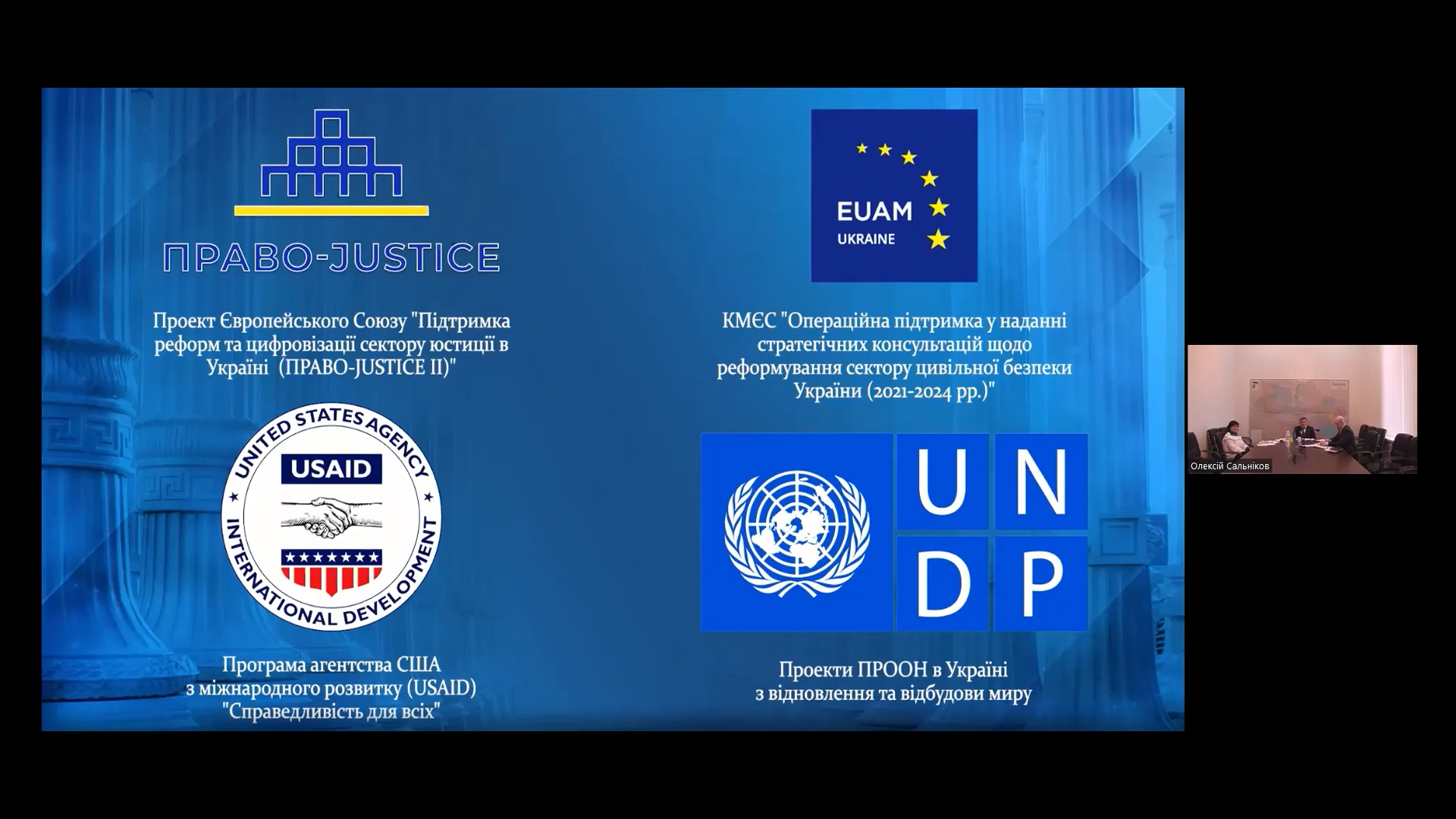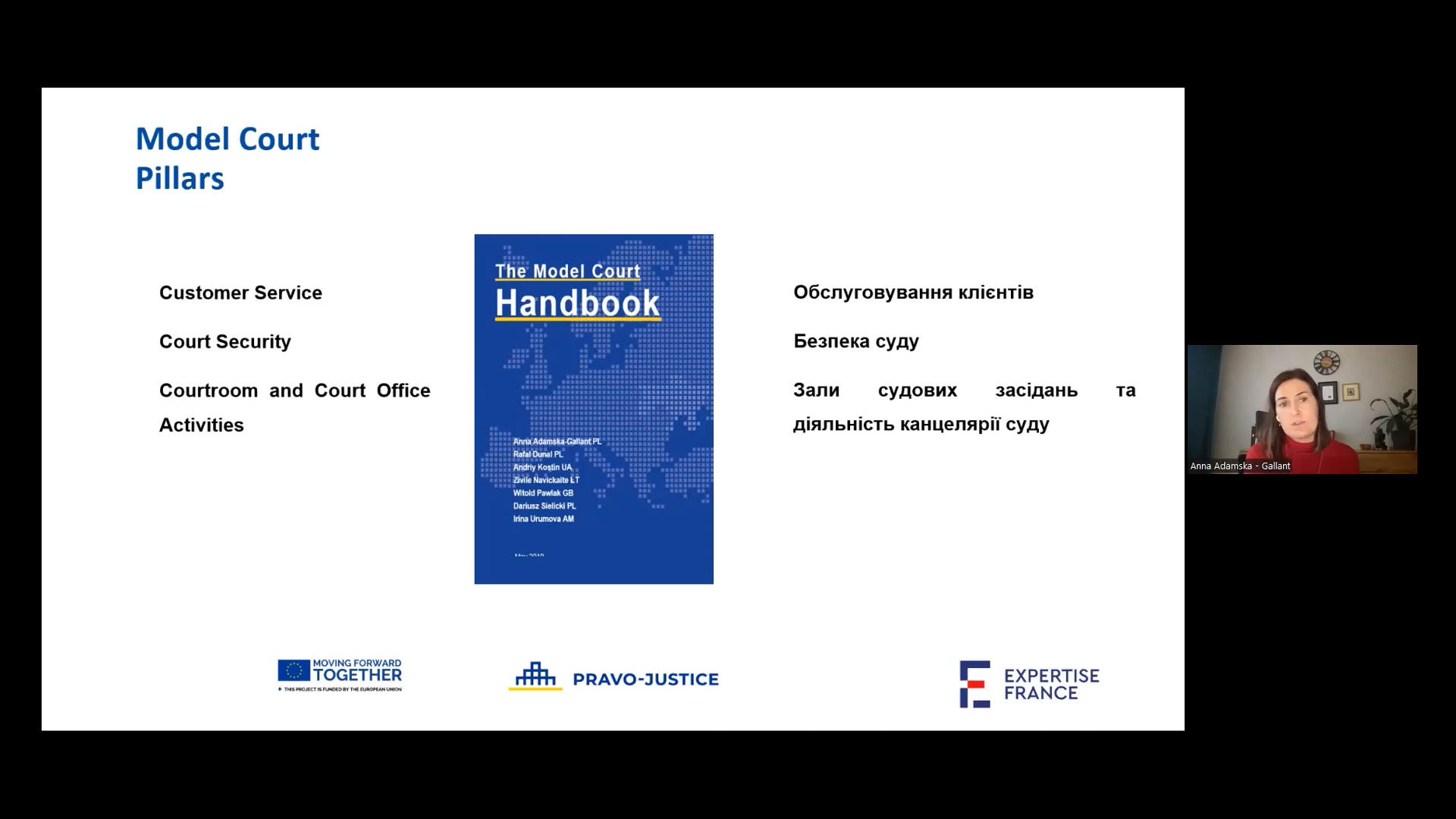With Support of the EU Project Pravo-Justice and USAID, an International Conference – “Courts in Wartime” was held

The State Judicial Administration of Ukraine together with the International Association for Court Administrators (IACA), EU Project Pravo-Justice and USAID Program Justice for All held an international conference “Courts in Wartime”.
About two hundred specialists from different countries of the world participated in the conference. The discussion was centered around the experience of arranging judiciary operations in Ukraine during a full-scale war. As noted by the meeting moderator, Luis Maria Palma, President of the International Association for Court Administrators, discussions about the Ukrainian experience of judiciary operations in wartime started at a similar event last year. The topic was so much interesting for the audience literally on all continents, and it was decided to dedicate a separate meeting to it.
Oleksii Salnikov, Head of the State Judicial Administration (SJA) of Ukraine, said that a full-scale Russian invasion in 2022 is the biggest challenge for the judiciary of Ukraine.
“Some parts of Ukraine were occupied by the Russian enemy very quickly. As some courts were not able to administer justice during martial law, the jurisdiction of the cases pending in them was changed,” said the Head of the SJA.
According to Oleksii Salnikov, at the beginning of 2022, 674 local and appellate courts were working in Ukraine. 85 courts do not operate in the temporarily uncontrolled territory, 54 of them stopped working after February 24, 2022. After the de-occupation of certain territories, some courts regained territorial jurisdiction and even came back to their premises – those that were not damaged or destroyed.
According to the State Judicial Administration of Ukraine, as of January 1, 2023, the premises of 12 courts were completely destroyed because of the invasion. 96 buildings were damaged. And not only that – as Oleksii Salnikov informed the attendants, more than 5,500 hardware were stolen from the courts that were in the occupied territories.
Given such circumstances, it was extremely challenging to make sure the judiciary resumes its work after occupation. The head of the SJA said that the help provided by international organizations turned out to be all the more invaluable:
“In 2022, EU Project Pravo-Justice and the USAID Program Justice for All accomplished a lot. For example, technical assistance, in particular equipment and other assets for the total amount of almost UAH 25 million was transferred to the State Judicial Administration. Moreover, within the framework of EU Project Pravo-Justice, helmets and bulletproof vests worth UAH 7.5 million, laptops worth UAH 380,000, and other equipment worth more than UAH 500,000 were transferred,” Oleksii Salnikov said.
In course of the conference, EU Project “Pravo-Justice” and the SJA had the opportunity to present the “Courts in Wartime” book to the general public. It included 10 stories about the experience of courts and their teams in the first months of the full-scale invasion. In particular, about temporary occupation and restoration of courts’ operations in localities close to places of active hostilities, evacuating employees and equipment, volunteering and assistance to colleagues. Olha Sribniak, Key National Expert of EU Project Pravo-Justice, noted that the experience of various courts during this period is important to better understand the challenges faced by the judiciary and to further take them into account in the future. However, according to her, this is not the only reason why this book can be of interest:
“Not only do the collected stories highlight how important it is to understand the problems and challenges, but they also provide vivid examples of leadership and teamwork for court teams because decisions had to be made quickly and in a well-coordinated manner. Also, the examples given in the book on the one hand demonstrate the importance of standard operating procedures, risk management, and on the other hand, the need for innovation, use of modern technologies, and flexibility. It’s no secret that not so many Ukrainians trust courts. We wanted this book to become, among other things, a step towards improving this situation, because it demonstrates the dignified and dedicated behavior of many people working in the judiciary.”
Luis Maria Palma, President of the International Association for Court Administrators noted that everyone who wants to understand what is happening in Ukraine and how the judiciary operates in wartime should familiarize themselves with the book “Courts in Wartime”.
Anna Adamska-Gallant, the Key International Expert on judiciary reform of EU Project Pravo-Justice, pointed out that among the tragedies and challenges of the year 2022, there were inspiring moments:
“I remember when Ukraine granted EU candidate status. For us, for Pravo-Justice, this news became a powerful impetus because Ukraine’s candidate status requires us to do work, and accelerate all the processes taking place in Ukraine. We can do a lot together. This is, on the one hand, supporting the relaunch of the judiciary, supporting judges and prosecutors to bring to justice everyone who committed war crimes in Ukraine. But it is also the introducing various best practices in Ukrainian courts despite the fact that they are currently having very tough times.”

Introducing best practices in court operations is an important area of the work done by Pravo-Justice Project. According to Anna Adamska-Gallant, the idea behind “Model Courts Initiative” came up almost 5 years ago. It was aimed at helping Ukrainian courts to implement best practices from various European countries in arranging courts processes. It is about convenient layout, working with visitors, security, and about court registry’s activities – all that makes the court comfortable and convenient for the citizens who go there. The initiative started with six courts, and currently more than 70 courts are participating in it and many courts want to join the initiative.
The Vinnytsia Court of Appeal is one of the most active participants in implementing the Model Courts Initiative.
“Many model solutions were made based on experience and thanks to communication and real support from Pravo-Justice. But the war brought about other conditions,” says Nataliia Korol, Chief of Staff at the Vinnytsia Court of Appeal, who as of recently is also a President of NGO All-Ukrainian Association of Court Employees. “The conditions caused by the full-scale invasion forced court administrators to look for unprecedented ways to ensure court operations. Of course, the main value is security. Security of people, data, communication, and property. What is security of people when it comes to the work in the Vinnytsia Court of Appeal? It means there is an air raid shelter, basic necessities for visitors and employees, alternative workplaces, an alternative courtroom.”
According to Nataliia Korol, in 2022, consideration of cases in the Vinnytsia Court of Appeal had to be postponed almost 4 thousand times, 2.5 thousand times – because of air raid alarms. Such statistics prompted the court staff to find a solution – to make an alternative courtroom in the shelter equipped with sound recording and video communication devices. Also, last year, 1,500 court sessions at the Vinnytsia Court of Appeal were held via video conference. Of these, in 1,000 there was connection with penal institutions or pre-trial detention centers as it was impossible to convoy arrested or imprisoned persons to the courtroom because of air alarms.
Nataliia Korol says currently, that this can be considered a model solution in court operations. At least the fact that at the conference she talked about the work of the Vinnytsia Court of Appeal was also a vivid example of how Ukrainian courts work in wartime.